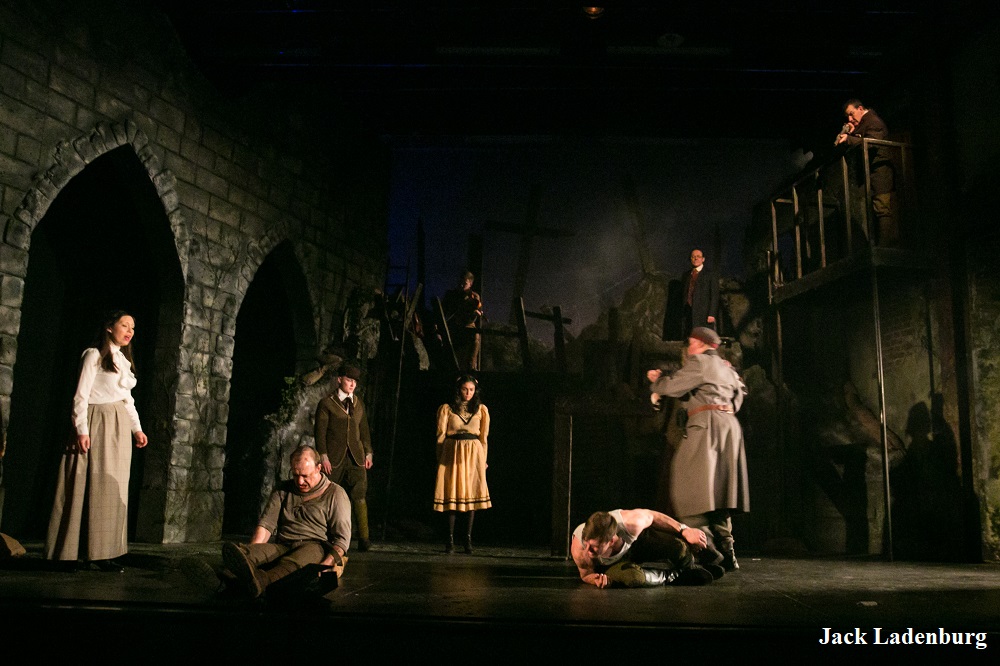‘Birdsong’ is an adaptation of the novel written by Sebastian Faulks and created for stage by Rachel Wagstaff. The story is set primarily in the trenches of WWI, following the character Stephen Wraysford, and his journey through love, death, and dealing with the mentally damaging effects of war.
Wraysford begins as the level-headed commander, keeping the soldiers in check and maintaining order, however, the effects of the war soon takes its toll on Wraysford, as he buckles under the extreme life-changing events that take place in the trenches. The light that keeps him going into the darkness is the memory of his first love; a married French woman who he has a passionate affair with, Isabelle.
The setting of the play is a fixed backdrop of the trenches and dilapidated buildings against a sheet of light that changes colour during the different scenes of the play. The set created a silhouette against the light which mirrored the classic picture on the cover of the novel, which was a nice touch. As cleverly arranged the set was, I felt, however, that it didn’t aid or compliment the story. The space felt too vast, as opposed to the claustrophobic feel of the trenches, especially in scenes when the soldiers were about to advance onto ‘no man’s land’. The backdrop was very 2-dimensional and lacked depth or that essence of grit and authenticity.
The play weaves between past and present frequently, moving from the moment Wraysford meets Isabelle and their illicit affair, to then sharply contrasting to the devastation of war life. The changes were not as crisp as they could have been; at times it was hard to know which was the past and which was the present, as the only indicator of time was the subtle light shifts. Having said that, the scene changes (and there were many!) flowed effortlessly and were choreographed very well, which kept the play moving at a desired pace.
There were special moments that really captured the atmosphere of the trenches, such as the scenes where the soldiers were digging tunnels underground. This was done very well by only using a wooden frame to suggest the supporting beams, which the characters crawled underneath, and small lanterns to guide them. The lanterns were the only light source in the theatre which was very effective as it created an eerie and tense atmosphere. Additionally, scenes were accompanied by singing and a violinist, played by James Findlay. This was extremely effective, and was played beautifully, enhancing the emotionally value of the story.
Another powerful scene is when the soldiers are reciting the letters they wrote to their loved ones back at home, which was indeed emotional. Throughout the play there is so much movement that it was a pleasure to relish a heart-felt moment. It was as if time had suddenly stopped, and the stillness of this scene grounded the story and its characters, specifically Jack Firebrace, fantastically played by Tim Treloar. Treloar’s performance throughout the play was indeed truthful and convincing; his presence on stage was strong and he held great focus and showed attention detail to all his emotions. I wish I could say the same for the lead, Stephen Wraysford, played by Tom Kay. He indeed looked the part with his tall statue and chiselled looks, but sadly, there was not much bubbling underneath the surface. He played to a good standard, but Kay’s portrayal of Wraysford fell flat. His character is very complex and the journey he takes is an emotional and difficult process, however, this was not expressed effectively. I couldn’t feel the connection with Kay as I did with the other actors, which left me disheartened as his character is the sole representation of the plays story.
In general, the whole feel of the play didn’t quite capture the right tone as it does in the book. Faulk’s story is one of the best pieces of literature I have read, and so to adapt this to stage it had to be done right, unfortunately, I was left dissatisfied and felt an injustice to such a compelling story. The impact of the war taking its toll on Wraysford was unsuccessful in its translation, which left me feeling dry and unmoved for the most part. I was yearning for the raw emotion, the passion of his affair, and the mental state of the soldiers, but there didn’t seem to be enough impact, whether this is down to direction or the way the play has been written, I’m not sure, but one thing is for certain, this magnificent story should have been left to the words of Sebastian Faulk’s, and to the readers’ imagination.
Reviewer: Parissa Zamanpour
Reviewed: 3rd April 2018
North West End Rating: ★★★

